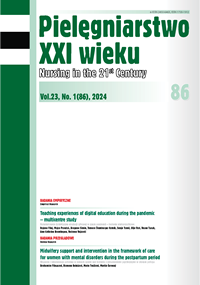Readiness to discharge patients after radical prostatectomy with the assistance of the da Vinci robot
DOI:
https://doi.org/10.2478/pielxxiw-2024-0004Keywords:
robotic surgery, prostatectomy, self-care, discharge readinessAbstract
READINESS TO DISCHARGE PATIENTS AFTER RADICAL PROSTATECTOMY WITH THE ASSISTANCE OF THE DA VINCI ROBOT
Aim. The study aimed to assess the readiness for discharge of patients after da Vinci robot-assisted radical prostatectomy.
Material and methods. The study included 100 patients on the day of discharge, treated in one of Warsaw’s hospitals at the turn of 2022 and 2023. The study was conducted by means of a diagnostic survey, the tool was the C-HOBIC questionnaire. The SPSS programme was used in the statistical analysis. A statistical signifi cance of p<0.05 was assumed.
Results. Patients demonstrated good readiness for discharge, especially in terms of knowledge about taking medications. They
showed the lowest readiness when it came to observing disturbing health-related symptoms. Education level had an impact on
patients’ ability to take medications.
Conclusions. Patients show good readiness to leave the hospital. Their knowledge of how to take medications is particularly good, although being able to notice symptoms or changes in health requires a little more attention. Pre-discharge education is a key element in preparing patients for self-care at home.
References
1. Hydzik P, Kolarczyk E, Kustrzycki W, et al. Readiness for Discharge from Hospital after Myocardial Infarction: A Cross-Sectional Study. Int. J. Environ. Res. Public. Health. 2021; 18(13): 6937. https://doi.org/10.3390/ijerph18136937
2. Reach G. The Mental Mechanisms of Patient Adherence to Long-Term Therapies: Mind and Care. Springer International Publishing, Germany, 2015.
3. Gaciong Z, Kardas P. Nieprzestrzeganie zaleceń terapeutycznych. Od przyczyny do praktycznych rozwiązań. Warszawa: Naukowa Fundacja Polfarmy, 2015.
4. Walsh CA, Cahir C, Tecklenborg S, et al. The association between medication non¬adherence and adverse health outcomes in ageing populations: A systematic review and meta-analysis. Br. J. Clin. Pharmacol. 2019; 85(11): 2464-2478.
5. Galvin EC, Wills T, Coffey A. Readiness for hospital discharge: A concept analysis. J. Adv. Nurs. 2017; 73(11): 2547-2557.
6. Cierzniakowska K, Kozłowska E, Popow A, et al. Assessment of readiness for discharge and self-care in patients treated surgically for colorectal cancer. Pielęg. Chir. Angio. Surgical and Vascular Nursing. 2022; 16(3): 108-116.
7. Weiss ME, Piacentine LB, Lokken L, et al. Perceived readiness for hospital discharge in adult medical-surgical patients. Clin. Nurse Spec. 2007; 21(1): 31-42.
8. Andruszkiewicz A, Kubica A, Nowik M, i wsp. Ocena gotowości do wypisu pacjentów z chorobami przewlekłymi. Zdr. Publ. Zarz. 2016; 14: 44-52.
9. Hannah K, White PA, Kennedy MA, et al. C-HOBIC - Standardized Information to Support Clinical Practice and Quality Patient Care across Canada. 2012; 23: 142.
10. Grabowska H, Derezulko D. Evaluate the readiness of post-operative patients for self-care. Surgical and Vascular Nursing. 2020; 14(1): 12-17.
11. Walewska E, Nowak A, Ścisło L, et al. Preparing the patient for self-care after total urinary resection. Nursing Problems. 2013; 21(1): 72-78.
12. Kosobucka A, Michalski P, Pietrzykowski Ł, et al. The impact of readiness to discharge from hospital on adherence to treatment in patients after myocardial infarction. Cardiol. J. 2022; 29(4): 582-590.
13. Kiłoczko W, Grabowska H. Using C-HOBIC data in the assessment of readiness for discharge of patients of the clinic of plastic surgery – a preliminary report. Surgical and Vascular Nursing. 2019; 13(1): 12-18.
14. Bączyk G, Głowacka A, Kozłowska KA, i wsp. Ocena stopnia samodzielności chorych z przetoką jelitową. Pielęg. Pol. 2016; 3: 360-366.
15. Horwitz LI, Moriarty JP, Chen C, et al. Quality of discharge practices and patient understanding at an academic medical center. JAMA Intern Med. 2013; 14; 173(18):1715-1722.
Downloads
Published
Issue
Section
License
Copyright (c) 2024 Authors

This work is licensed under a Creative Commons Attribution 4.0 International License.




